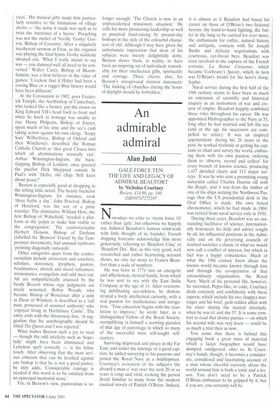An admirable admiral
Alan Judd
GALE FORCE TEN: THE LIFE AND LEGACY OF ADMIRAL BEAUFORT by Nicholas Courtney Review, f14.99, pp. 340, ISBN0747272107 Nowadays we refer to 'storm force 10' rather than 'gale', but otherwise we happily use Admiral Beaufort's famous wind-scale with little thought of its founder. French shipping forecasts acknowledge him more generously, referring to 'Beaufort Cinq' or 'Beaufort Dix'. But, as this very good, well researched and rather heartening account shows, we owe far more to Francis Beaufort than a scale of numbers.
He was born in 1774 into an energetic and affectionate clerical family, from which he was sent to sea with the East India Company at the age of 14. After overcoming debilitating sea-sickness, he demonstrated a lively intellectual curiosity, with a real passion for mathematics and navigation. 'True education begins with the resolution to improve,' he wrote later, as a distinguished Fellow of the Royal Society, exemplifying in himself a seeming paradox of that age of patronage in which so many of the successful were self-taught selfstarters.
Surviving shipwreck and piracy in the Far East, and under the tutelage of a good captain, he added surveying to his passions and joined the Royal Navy as a midshipman. Courtney's evocation of his subject's life aboard a man o' war over the next 20 or so years is crisp and vivid, evoking the period detail familiar to many from the modern nautical novels of Patrick O'Brian. Indeed,
it is almost as if Beaufort had based his career on those of O'Brian's two fictional heroes: the hand-to-hand fighting, the bullet in the lung to be carried for ever more, the enthusiasm for coffee, natural history and antiquity, contacts with Sir Joseph Banks and delicate negotiations with courteous, cut-throat beys. Beaufort was even involved in the capture of the French corvette, La Bonne Citoyenne, which became Cochrane's Speedy, which in turn was O'Brian's model for his hero's sloop, Sophie.
Naval service during the first half of the 19th century seems to have been as much an extension of scientific and historical enquiry as an instrument of war and creator of empire. Beaufort happily combined these roles throughout his career. He was appointed Hydrographer to the Navy at 55, long after he had married and left the sea (and at the age his successors are compelled to retire). It was an inspired appointment: during his 26 years in the post, he worked tirelessly at getting his captains to chart and survey the world, enthusing them with his own passion, ordering them to 'observe, record and collect' for every branch of known science, producing 1,437 detailed charts and 113 major surveys. It was he who sent a promising young naturalist called Charles Darwin off with the Beagle, and it was from the timber of one of his ships seeking the Northwest Passage that the US presidential desk in the Oval Office is made. His own boxed chronometer, which he had made in 1804, was retired from naval service only in 1930.
During these years, Beaufort was an outstanding facilitator of science, internationally honoured, his help and advice sought by all, his influential positions in the Admiralty and on the governing councils of learned societies a classic of what we would now call a conflict of interest, but which in fact was a happy coincidence. Much of what the 19th century knew about the known world became known through him and through the co-operation of that extraordinary organisation, the Royal Navy. Much of his personal life, however, he recorded, Pepys-like, in code; Courtney deals concisely and confidently with these aspects, which include his two (happy) marriages and his brief, guilt-ridden affair with his sister during the marital interlude, when he was 61 and she 57. It is some comfort to read that dinner-parties — on which his second wife was very keen — could be as much a trial then as now.
You sense that there is behind this engaging book a great mass of material which a lazier biographer would have dumped, undigested, onto us, In Courtney's hands, though, it becomes a considerate, considered and fascinating account of a man whose cheerful curiosity about the world around him is both a tonic and a lesson. You don't need to be a Patrick O'Brian enthusiast to be gripped by it, but if you are, you certainly will be.






















































































 Previous page
Previous page